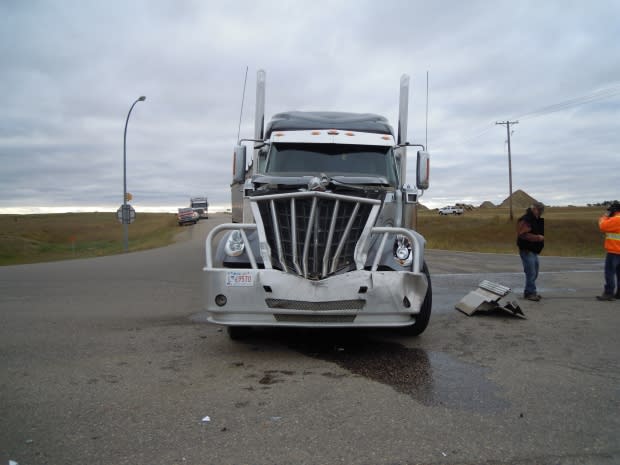'People are afraid to drive on our highways': Ottawa asked to regulate truck-driver training
More than 1,200 people are petitioning the federal government to regulate the training of semi-trailer truck drivers after accidents such as the Humboldt Broncos bus disaster that killed 16 people last April.
Saskatchewan and other provincial governments have failed to keep roads safe, according to experts and the families of some accident victims.
"People are afraid to drive on our highways," said Pattie Babij, whose husband Stephen was killed in a collision with a semi last year.
"It's pretty basic. Do we debate this for years, or do we actually do something about it?"
She started a petition demanding mandatory training regulated by the federal government across Canada. The petition gained momentum after the Humboldt Broncos collision on April 6. She's collected more than 1,200 names.
Babij said the change is a "no-brainer," and that she won't rest until changes are made.

"Every province is reacting or not reacting in a different way, and it doesn't make any sense. These trucks are traveling across Canada. This is a federal issue, not a provincial issue," she said.
Last week, the Saskatchewan government announced training will soon be mandatory for semi drivers in the province, but farmers will be exempt.
Other provinces with mandatory training have no farmer exemptions. Others don't seem to have any plan, Babij and others said.
The "checkerboard" of rules won't make roads safer, said University of Manitoba infrastructure professor Ahmed Shalaby.
He said the federal government has strict regulations if you travel in a plane, boat or train, but for some reason leaves it up to the provinces when it comes to semis and other vehicles.

Shalaby said this is makes no sense, given that 95 per cent of all transportation fatalities and 98 per cent of transportation collisions occur on roadways.
He said the federal government clearly has the power to regulate roads and should take over. He also said provincial governments should agree to step aside immediately.
Shalaby said the U.S. and Europe are far ahead of Canada in this area: the U.S. has had national trucking regulations for years, while Europe has many national regulations as well as some regional rules that span multiple countries.
"We have unsafe conditions on the road today. I don't understand the hesitation to raise these issues quickly and to deal with them. As we have seen, these are very serious issues. A trucker without the kind of training they need before they get behind the wheel is basically a danger to everybody."
University of Saskatchewan professor Alexander Crizzle recently did a study in which he talked to 250 long haul truck drivers about nutrition, stress, sleep, workload and road safety.
Crizzle, who works in the university's School of Public Health, said even truckers want national, mandatory training for anyone driving a semi.
"The regulations need to apply across jurisdictions, and there can't be exceptions because you've got one place that's more rural than another or [because] you have more farmers in one place than another," Crizzle said.
"Truckers do care, and I know farmers do care, about road safety and ensuring the safest roads possible. If you want to improve perceptions of this line of work, you need some rules in place that will ensure that people can be safe."
Crizzle said it doesn't matter why you're on the road, everyone just wants to get home safely. He noted the suggested changes could have a significant impact. He said that with an estimated 300,000 long haul truckers working today in Canada, proper training could save many lives.

Babij, who started the petition, said she's been trying unsuccessfully to get a meeting with federal Transport Minister Marc Garneau. She's planning to present the petition to him in the next month or so and hopes policy makers will take urgent action.
"If their loved one gets injured, they'll realize what is going on on our highways. How on Earth can this be dealt with provincially?" she said.
Garneau was not available for an interview.
An official in his office said in an emailed statement they favour mandatory training, but wouldn't say whether the federal government will take over that responsibility.
Garneau is meeting with provincial transport ministers in January and will raise the issue with them, said the statement.
"Our roads in Canada need to stay safe and secure for the people that drive on them," said the statement.

